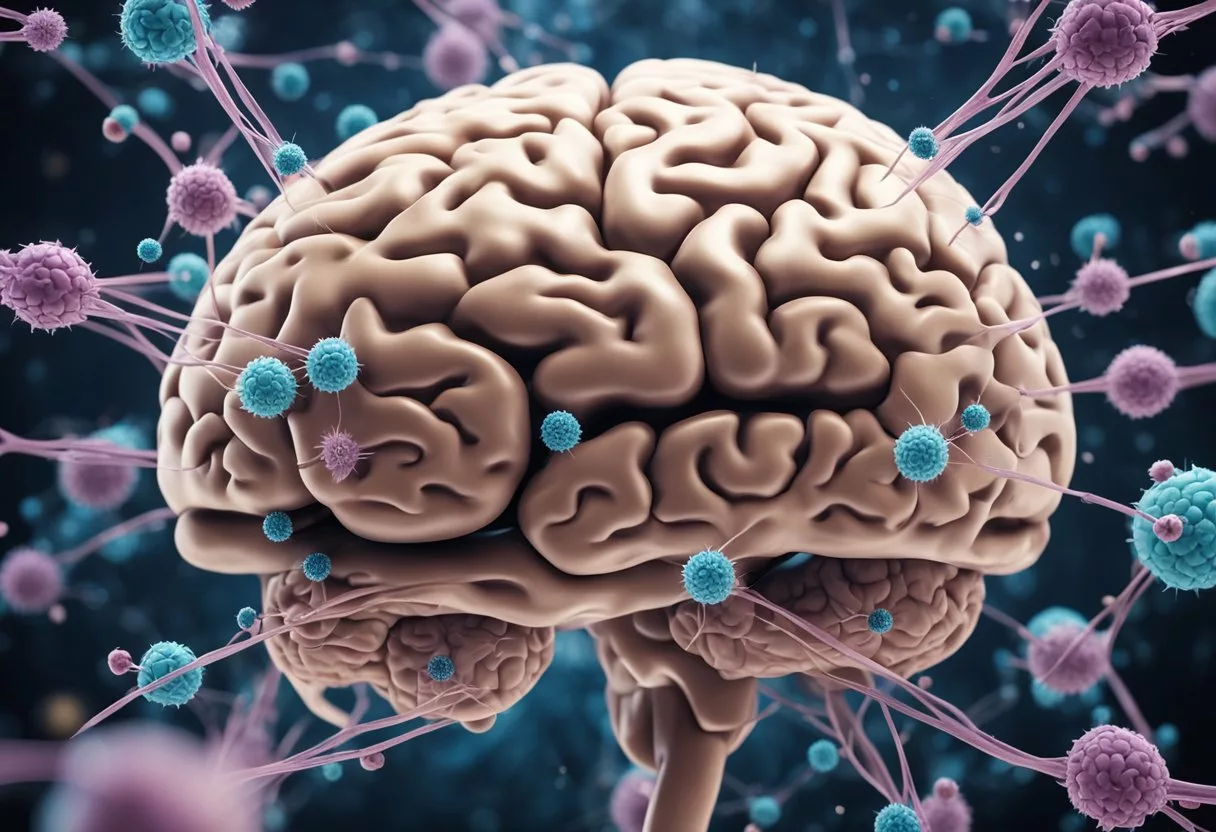Sleep and immune function are two interconnected systems that play crucial roles in maintaining health. Sleep is a fundamental physiological need that is essential for the body to function properly. Adequate sleep is necessary for the immune system to function optimally, and conversely, the immune system can affect sleep patterns.

What to do before bed to sleep better:
Watch the video NOW!
The immune system is responsible for protecting the body against pathogens and foreign invaders. It is composed of various cells, tissues, and organs that work together to detect and eliminate threats to the body. Sleep plays a critical role in supporting the immune system by regulating the production and activity of immune cells. During sleep, the body produces cytokines, which are proteins that help fight off infections and inflammation. Lack of sleep can impair the immune system’s ability to produce cytokines, making it more difficult for the body to fight off infections.
Key Takeaways
- Sleep and immune function are interconnected systems that play crucial roles in maintaining health.
- Adequate sleep is necessary for the immune system to function optimally, and conversely, the immune system can affect sleep patterns.
- Lack of sleep can impair the immune system’s ability to fight off infections.
The Physiology of Sleep

Sleep is a complex phenomenon that is essential for maintaining good health and well-being. The physiology of sleep is regulated by a complex interplay of various factors, including circadian rhythms, sleep stages, and sleep duration.
Circadian Rhythms and Sleep Cycles
Circadian rhythms are 24-hour cycles that regulate various physiological processes in the body, including sleep-wake cycles. The suprachiasmatic nucleus (SCN) in the hypothalamus plays a crucial role in regulating circadian rhythms. The SCN receives input from the retina and synchronizes the body’s internal clock with the external environment.
Sleep-wake cycles are regulated by the interaction of circadian rhythms and sleep homeostasis. Sleep homeostasis refers to the body’s need for sleep, which increases during wakefulness and decreases during sleep. The interaction of these two processes results in a typical sleep-wake cycle, which consists of alternating periods of wakefulness and sleep.
Sleep Stages and Their Functions
Sleep is composed of two main types of sleep: non-rapid eye movement (NREM) sleep and rapid eye movement (REM) sleep. NREM sleep is further divided into three stages: N1, N2, and N3.
During N1 sleep, which is the lightest stage of sleep, people may experience hypnic jerks or falling sensations. N2 sleep is characterized by a decrease in muscle tone and the presence of sleep spindles and K-complexes. N3 sleep, also known as slow-wave sleep (SWS), is the deepest stage of sleep and is characterized by slow brain waves.
REM sleep is characterized by rapid eye movements and is associated with dreaming. During REM sleep, the body is in a state of muscle atonia or paralysis, which prevents people from acting out their dreams.
Each stage of sleep has a unique set of functions. NREM sleep is important for physical restoration, while REM sleep is important for cognitive and emotional processing. Slow-wave sleep (SWS) is particularly important for memory consolidation and immune function.
Sleep Regulation and Normative Sleep Values
Sleep regulation is influenced by a variety of factors, including age, genetics, lifestyle, and environmental factors. The National Sleep Foundation provides normative sleep values for different age groups, which can serve as a useful guide for determining whether an individual is getting enough sleep.
In general, adults require 7-9 hours of sleep per night, while infants and children require more. Sleep duration can also be influenced by factors such as caffeine intake, exercise, and stress.
In conclusion, sleep is a complex and essential process that is regulated by a variety of factors, including circadian rhythms, sleep stages, and sleep duration. Understanding the physiology of sleep can help individuals optimize their sleep and improve their overall health and well-being.
Immune System Fundamentals

The immune system is a complex network of cells, tissues, and organs that work together to protect the body from harmful pathogens, such as bacteria, viruses, and fungi. The immune system is divided into two main categories: innate immunity and adaptive immunity.
Innate vs. Adaptive Immunity
Innate immunity is the body’s first line of defense against pathogens. This type of immunity is non-specific and does not require prior exposure to the pathogen. Innate immunity includes physical barriers, such as skin and mucous membranes, as well as immune cells, such as natural killer cells, monocytes, and leukocytes.
Adaptive immunity, on the other hand, is a specific response to a particular pathogen. This type of immunity requires prior exposure to the pathogen and involves the activation of T helper cells and B cells. T helper cells help to activate other immune cells, while B cells produce antibodies that can recognize and neutralize the pathogen.
Immune Cells and Their Roles
There are several types of immune cells that play different roles in the immune system. Natural killer cells are a type of innate immune cell that can recognize and kill infected cells. Monocytes are another type of innate immune cell that can engulf and destroy pathogens. Leukocytes are a type of white blood cell that can recognize and destroy pathogens.
T helper cells are a type of adaptive immune cell that help to activate other immune cells. Antigen-presenting cells, such as dendritic cells, macrophages, and B cells, help to present antigens to T cells, which then activate other immune cells.
Overall, the immune system is a complex network of cells and tissues that work together to protect the body from harmful pathogens. Innate immunity provides the body’s first line of defense, while adaptive immunity provides a specific response to particular pathogens. Understanding the roles of different immune cells is essential for understanding how the immune system functions to protect the body.
Interactions Between Sleep and Immune Function

Impact of Sleep on Immunity
Sleep is a critical physiological process that plays a vital role in maintaining immune function. During sleep, the body produces cytokines, which are proteins that regulate the immune system. These cytokines help to promote sleep and enhance the body’s ability to fight off infections and diseases.
Research has shown that sleep deprivation can have a significant impact on immune function. Lack of sleep can lead to a decrease in the production of cytokines, which can weaken the immune system and make the body more susceptible to infections and diseases. In addition, chronic sleep deprivation can lead to an increase in the production of pro-inflammatory cytokines, which can cause inflammation and damage to tissues throughout the body.
Effect of Immune Response on Sleep
The immune response can also have a significant impact on sleep. When the body is fighting off an infection or disease, it produces pro-inflammatory cytokines, which can cause fatigue, sleepiness, and a decrease in the quality of sleep. This response is known as the sickness behavior, and it is a natural response to help the body conserve energy and fight off infection.
In addition, chronic inflammation can lead to a disruption in the sleep-wake cycle, which can further weaken the immune system and increase the risk of developing chronic diseases. Studies have shown that individuals with chronic inflammatory conditions, such as rheumatoid arthritis and multiple sclerosis, often experience disrupted sleep patterns and increased fatigue.
Overall, the interactions between sleep and immune function are complex and bidirectional. Sleep plays a critical role in maintaining immune function, while the immune response can have a significant impact on sleep. Understanding these interactions is essential for developing effective strategies to promote healthy sleep and maintain optimal immune function.
Consequences of Sleep Deprivation

Sleep is essential for overall health, and sleep deprivation can have negative impacts on immune function. Short-term sleep deprivation can lead to increased levels of cortisol and catecholamines, which are stress hormones that can suppress immune function. In addition, short-term sleep deprivation can result in alterations in the numbers and activity of specific immune cells, leading to a compromised immune response [1].
Short-Term Sleep Deprivation Effects
Studies have shown that even a single night of total sleep deprivation can result in significant changes in immune function. Total sleep deprivation has been found to be associated with alterations in the circulating numbers and/or activity of total leukocytes and specific cell subsets, elevation of systemic and tissue pro-inflammatory markers, and increased susceptibility to infections [1][2].
Long-Term Sleep Deprivation and Health Risks
Long-term sleep deprivation can have even more serious consequences on immune function and overall health. Chronic sleep loss has been linked to an increased risk of chronic diseases such as obesity, diabetes, and cardiovascular disease, which are also associated with chronic low-grade inflammation [3]. Chronic sleep deficiency has also been linked to an increased risk of infections, as well as impaired immune responses to vaccinations [4].
Recovery sleep can help to counteract some of the negative effects of short-term sleep deprivation on immune function. However, the long-term consequences of chronic sleep deprivation on immune function and overall health are still not fully understood, and more research is needed to fully understand the relationship between sleep and immune function.
In conclusion, sleep deprivation can have negative consequences on immune function, both in the short-term and long-term. Short-term sleep deprivation can lead to alterations in immune cell activity, while chronic sleep deprivation has been linked to an increased risk of chronic diseases and infections. It is important to prioritize sleep as an essential component of overall health and well-being.
References:
- Role of sleep deprivation in immune-related disease risk and outcomes
- Sleep & Immunity: Can a Lack of Sleep Make You Sick?
- Sleep and inflammation: partners in sickness and in health
- Sleep deprivation and the immune response: a review
Sleep Disorders and Immune-related Health Conditions

Insomnia and Immune Function
Insomnia is a sleep disorder characterized by difficulty falling or staying asleep. Insufficient sleep has been shown to have a negative impact on immune function, increasing susceptibility to infections and impairing the body’s ability to fight off pathogens. Chronic insomnia has been associated with increased levels of inflammation, which can contribute to the development of a variety of health conditions, including cardiovascular disease, hypertension, atherosclerosis, diabetes, rheumatologic disorders, breast cancer, and neurodegeneration.
Sleep Apnea and Systemic Inflammation
Sleep apnea is a disorder characterized by pauses in breathing during sleep, which can lead to decreased oxygen levels in the blood. This can cause systemic inflammation, which has been linked to a variety of health conditions, including cardiovascular disease, hypertension, atherosclerosis, and diabetes. Sleep apnea has also been associated with impaired immune function, increasing susceptibility to infections.
Circadian Rhythm Disorders and Immunity
Circadian rhythm disorders are disruptions in the body’s natural sleep-wake cycle. These disruptions can have a negative impact on immune function, increasing susceptibility to infections and impairing the body’s ability to fight off pathogens. Disruptions to the circadian rhythm have also been associated with increased levels of inflammation, which can contribute to the development of a variety of health conditions, including cardiovascular disease, hypertension, atherosclerosis, diabetes, rheumatologic disorders, breast cancer, and neurodegeneration.
Overall, sleep disorders can have a negative impact on immune function, increasing susceptibility to infections and impairing the body’s ability to fight off pathogens. Chronic sleep deprivation has been associated with increased levels of inflammation, which can contribute to the development of a variety of health conditions. It is important to prioritize sleep health in order to maintain a strong immune system and reduce the risk of developing immune-related health conditions.
Infectious Diseases and Sleep

Infectious diseases are caused by pathogenic microorganisms such as bacteria, viruses, fungi, and parasites. These diseases can affect the immune system and disrupt sleep patterns. In this section, we will discuss the relationship between sleep and infectious diseases.
Common Cold and Flu
The common cold and flu are viral infections that can cause symptoms such as fever, cough, and sore throat. Lack of sleep can weaken the immune system and increase the risk of catching these viruses. A study published in the Sleep journal found that people who slept less than seven hours per night were three times more likely to develop a cold than those who slept eight hours or more per night. Getting enough sleep can help the body fight off these infections.
Hepatitis and Sleep Patterns
Hepatitis is a viral infection that affects the liver. Hepatitis A is a contagious liver infection caused by the hepatitis A virus (HAV). A study published in the Journal of Clinical Sleep Medicine found that people with HAV infection had disrupted sleep patterns, including decreased sleep efficiency and increased wake time after sleep onset. The study suggests that sleep patterns may be used as a marker for HAV infection.
Vaccinations and Sleep-Dependent Immune Modulation
Vaccinations are an effective way to prevent infectious diseases. Sleep plays an important role in the immune response to vaccines. A study published in the Journal of Sleep Research found that sleep deprivation can impair the immune response to vaccination. The study suggests that getting enough sleep before and after vaccination can improve the effectiveness of the vaccine.
In conclusion, infectious diseases can affect sleep patterns and vice versa. Getting enough sleep is important for maintaining a healthy immune system and preventing infectious diseases. Vaccinations can also help prevent infectious diseases, and getting enough sleep before and after vaccination can improve their effectiveness.
Hormonal and Neuroendocrine Regulation of Sleep and Immunity

Cortisol and Sleep
Cortisol is a hormone that is released by the adrenal glands in response to stress. It plays a key role in the regulation of the sleep-wake cycle. Cortisol levels are highest in the morning and gradually decrease throughout the day, reaching their lowest point at night. This decrease in cortisol levels helps to promote sleep.
However, chronic stress can disrupt the normal cortisol rhythm, leading to increased cortisol levels at night and disrupted sleep. This can have negative effects on immune function, as cortisol has immunosuppressive effects. Therefore, chronic stress and disrupted sleep can lead to increased susceptibility to infections and other immune-related diseases.
Growth Hormone and Immune Function
Growth hormone (GH) is a hormone that is released by the pituitary gland and plays a key role in growth and development. It also has important effects on immune function. GH stimulates the production of immune cells, such as T cells and B cells, and enhances their function.
GH is released in a pulsatile manner throughout the day, with the highest levels occurring during sleep. Therefore, disrupted sleep can lead to decreased GH secretion and impaired immune function. Additionally, GH deficiency has been associated with increased susceptibility to infections and other immune-related diseases.
Prolactin, Sleep, and Immunity
Prolactin is a hormone that is released by the pituitary gland and plays a key role in lactation. However, it also has important effects on sleep and immune function. Prolactin levels are highest during sleep, particularly during the rapid eye movement (REM) phase of sleep.
Prolactin has been shown to have immunomodulatory effects, such as stimulating the production of immune cells and enhancing their function. Additionally, prolactin has been shown to have anti-inflammatory effects, which can help to protect against immune-related diseases.
Overall, the hormonal and neuroendocrine regulation of sleep and immunity is complex and multifaceted. Cortisol, GH, and prolactin are just a few of the many hormones that play important roles in this process. Disrupted sleep and chronic stress can lead to dysregulation of these hormones, which can have negative effects on immune function. Therefore, it is important to prioritize healthy sleep habits in order to maintain optimal immune function.
Behavioral and Lifestyle Factors Affecting Sleep and Immunity

Sleep is an essential aspect of health, and there are several behavioral and lifestyle factors that can impact both sleep quality and immune function. Understanding these factors can help individuals optimize their sleep and immune health.
Physical Activity and Sleep Quality
Regular physical activity is associated with better sleep quality, which can, in turn, improve immune function. Exercise can help regulate the body’s natural sleep-wake cycle, leading to better sleep quality and duration. Additionally, physical activity can reduce stress and anxiety, which can also improve sleep quality and immune function.
Nutrition and Immune Health
Diet plays a crucial role in immune function, and certain nutrients can impact sleep quality. For example, magnesium and zinc have been shown to improve sleep quality, while caffeine and alcohol can disrupt sleep. Eating a balanced diet with plenty of fruits, vegetables, and whole grains can provide the body with the nutrients it needs to support immune function and healthy sleep.
Stress and Its Impact on Sleep and Immunity
Stress can have a significant impact on both sleep quality and immune function. Chronic stress can lead to sleep disturbances, which can impair immune function. Additionally, stress can directly impact immune function by increasing inflammation and reducing the body’s ability to fight off infections. Cognitive-behavioral therapy and stress-reducing techniques, such as meditation and mindfulness, can help individuals manage stress and improve sleep quality and immune function.
In conclusion, several behavioral and lifestyle factors can impact both sleep quality and immune function. By prioritizing regular physical activity, eating a balanced diet, and managing stress, individuals can optimize their sleep and immune health.
Advances in Sleep and Immunology Research

Psychoneuroimmunology and Sleep
Recent advances in psychoneuroimmunology and sleep research have shown that sleep plays a crucial role in regulating the immune system. Psychoneuroimmunology is the study of how the nervous and immune systems interact with each other. Sleep deprivation can lead to an increase in pro-inflammatory cytokines, which can lead to chronic low-grade inflammation. Chronic low-grade inflammation is associated with a range of diseases, including cardiovascular disease, diabetes, and cancer.
Immunological Memory and Sleep
Immunological memory is the ability of the immune system to remember and recognize pathogens that the body has previously encountered. Recent research has shown that sleep plays a crucial role in the formation of immunological memory. During sleep, the immune system produces cytokines, which help to regulate the immune response. These cytokines are also involved in the formation of immunological memory. Sleep deprivation can lead to a decrease in cytokine production, which can impair the formation of immunological memory.
Overall, advances in sleep and immunology research have shown that sleep is essential for maintaining a healthy immune system. Sleep plays a crucial role in regulating the immune response, and sleep deprivation can lead to an increase in pro-inflammatory cytokines, chronic low-grade inflammation, and impaired formation of immunological memory. These findings have important implications for the prevention and treatment of a range of diseases, and suggest that sleep may be a useful prognostic indicator for mortality and host defense.
Clinical Implications and Therapeutic Interventions
Sleep Interventions in Immune-related Disorders
Sleep plays a vital role in immune function, and sleep interventions can have a significant impact on immune-related disorders. Sleep hygiene education, cognitive-behavioral therapy for insomnia (CBT-I), and continuous positive airway pressure (CPAP) therapy are among the interventions that have been shown to improve sleep quality and duration.
In addition to improving sleep, these interventions have been shown to have a positive impact on immune function. For example, CBT-I has been shown to increase natural killer (NK) cell activity, an important component of the innate immune system. CPAP therapy has been shown to decrease levels of the pro-inflammatory cytokine interleukin-6 (IL-6) in patients with obstructive sleep apnea (OSA), a condition that is associated with increased risk of cardiovascular disease and other immune-related disorders.
Immunotherapy and Sleep Management
Immunotherapy is a promising approach to the treatment of immune-related disorders, and emerging research suggests that it may also have an impact on sleep. For example, a study published in the journal Sleep Medicine found that treatment with the immunomodulatory drug rituximab improved sleep quality in patients with rheumatoid arthritis.
In addition to immunotherapy, other pharmacological interventions may also have an impact on sleep in patients with immune-related disorders. For example, the use of selective serotonin reuptake inhibitors (SSRIs) has been shown to improve sleep in patients with depression and other psychiatric disorders that are associated with immune dysfunction.
Overall, the sleep-immunity relationship raises relevant clinical implications for promoting sleep health and managing immune-related disorders. Sleep interventions, such as sleep hygiene education, CBT-I, and CPAP therapy, can improve sleep quality and duration, and may have a positive impact on immune function. In addition, emerging research suggests that immunotherapy and other pharmacological interventions may also have an impact on sleep in patients with immune-related disorders.
It is important to note that the bidirectional relationship between sleep and immune function is complex, and further research is needed to fully understand the mechanisms underlying this relationship. However, the available evidence suggests that sleep interventions and pharmacological interventions that target the immune system may be important tools in the management of immune-related disorders.
Frequently Asked Questions
How does sleep deprivation impact the immune system?
Sleep deprivation can have a negative impact on the immune system. Research has shown that lack of sleep can weaken the immune system, making it more difficult for the body to fight off infections and illnesses. Sleep deprivation can also affect the body’s ability to produce cytokines, which are important for immune function.
What role do cytokines play in sleep and immune regulation?
Cytokines are proteins that play a key role in the immune system. They help to regulate immune function and are involved in the body’s response to infection and inflammation. Cytokines also play a role in sleep regulation, as they can influence sleep patterns and promote the onset of sleep.
Can improving sleep quality boost the immune system’s effectiveness?
Improving sleep quality can have a positive impact on the immune system. Research has shown that getting enough sleep and improving sleep quality can help to strengthen the immune system and improve its effectiveness. This is because sleep allows the body to produce cytokines and other immune cells that are important for fighting off infections and illnesses.
Is there a connection between REM sleep and immune system functioning?
There is a connection between REM sleep and immune system functioning. REM sleep is important for the body to restore and repair itself, and it plays a role in immune function. During REM sleep, the body produces cytokines and other immune cells that are important for fighting off infections and illnesses.
Does consistent lack of sleep contribute to inflammation in the body?
Consistent lack of sleep can contribute to inflammation in the body. Research has shown that sleep deprivation can cause the body to produce more inflammatory cytokines, which can lead to inflammation and contribute to the development of chronic diseases.
Can a deficiency in sleep increase the risk of developing autoimmune diseases?
A deficiency in sleep can increase the risk of developing autoimmune diseases. Research has shown that sleep deprivation can cause the body to produce less cytokines, which can lead to an increased risk of developing autoimmune diseases. Additionally, lack of sleep can also contribute to inflammation in the body, which is a key factor in the development of autoimmune diseases.